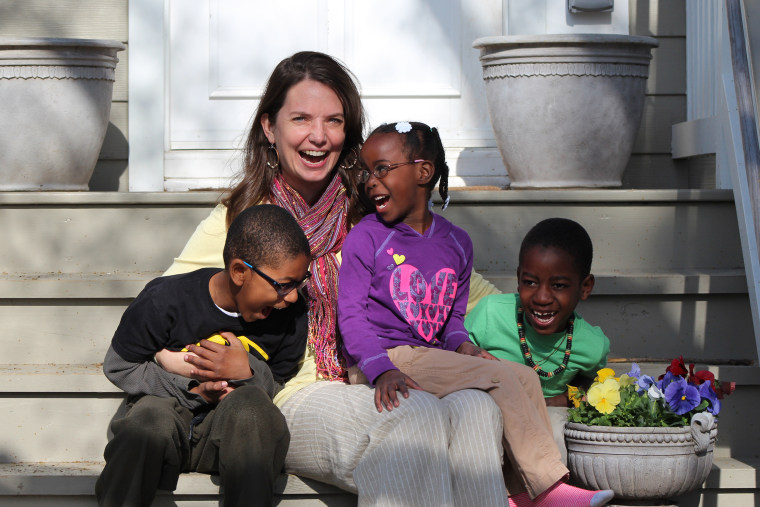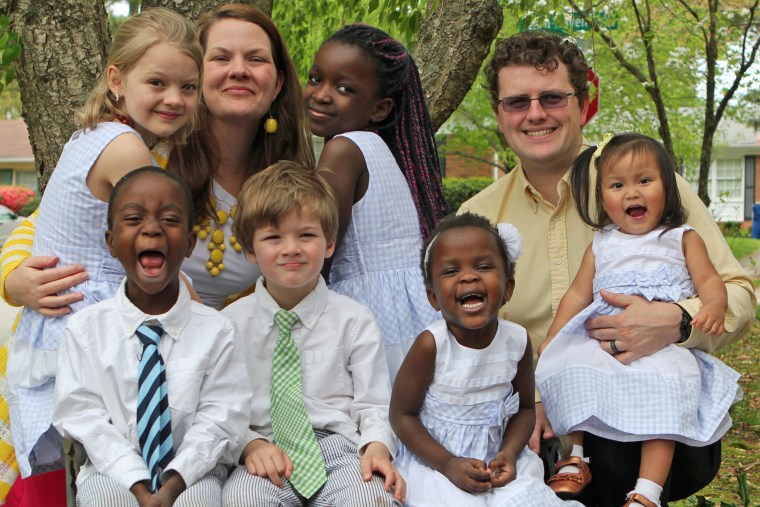When Shannon Dingle and her family returned home from Uganda after adopting three children, one of whom is HIV positive, she noticed something strange.
Her best friends, a couple she and her husband had been close to for years, were suddenly absent.
“We used to talk on the phone every day,” says Dingle, a Raleigh, N.C. mother of six, “but we’d been home for two months, and I chalked it up to our family still having a lot of culture shock being back.”
She only found what was “really going on” when she asked her girlfriend whether anyone was inquiring about the adoption, figuring acquaintances might be more comfortable asking her best friend than coming directly to her.
“Actually, our best friends told us, they weren’t comfortable having play dates anymore,” recalls Dingle. “They said child accidents occur like skinned knees, and even though I explained HIV is not transmitted that way, and my husband later sat down with her husband and shared all the HIV information we could, they did not want to be around our child who is positive.”
It felt like a punch in the gut, says Dingle. HIV discrimination may seem like a relic of the 1980s, when Ryan White publicly struggled for acceptance and people still worried about "catching AIDS" through casual contact. But for parents of HIV-positive children, that discrimination remains an everyday struggle.
“We want her to know there is no shame in this diagnosis and this is only part of her life,” explains Dingle, who does not disclose which of her children has HIV — she says she uses the female pronoun for convenience.
According to the CDC, there has been a dramatic decline in the number of US babies born with HIV to fewer than 200 per year today. Women with HIV now have less than a 1 percent chance of passing the disease to their babies.
But disclosure is still a precarious issue for US families who adopt HIV positive children abroad. On the one hand, by keeping the diagnosis secretive, parents worry they are stigmatizing HIV in their own home, and that younger kids may accidentally drop a bombshell of sensitive information to friends and even strangers in the grocery line.
On the other hand, Dr. Jane Aronson, a pediatric infectious disease specialist and CEO of Worldwide Orphans, says HIV-positive children have a right to keep their status private until they are ready and able to make an independent decision.
“I do not recommend disclosure to adopted families,” says Dr. Aronson. “When it comes to our family’s survival and our children contracting any type of disease, we are all afraid. It’s human nature.”
But HIV-positive kids are perfectly healthy once they get medication, she explains, and it’s just not developmentally appropriate for a 5 or 7-year old to process any kind of chronic medical illness, HIV or otherwise. “It’s not your flag to wave,” she cautions parents.

In contrast, Linda Walsh, a University of Chicago nurse practitioner who has spent the last decade in pediatric HIV care, says "if we blanketly tell people never, ever disclose we can't evolve." Walsh tells parents to trust their gut on whether to disclose a child's HIV status outside of the immediate family.
“We say it’s our family’s private business but it’s not ‘a secret’ because secrecy carries so much weight with children,” describes Deborah Steiner, a Chicago lawyer and single parent of three adopted children, two of whom are from Uganda and are HIV positive. Steiner blogs about her experience with HIV adoption and is the Director of Operations for Project Hopeful, an organization that helps people adopt overlooked children around the world. “I’ve already said to Zachariah, it stinks to have HIV,” says Steiner. “But I tell him how healthy and strong he is every day.”
For some white parents, adopting a child with HIV can be their first taste of discrimination. It’s also impossible to know whether people are truly reacting to a child’s HIV status, skin color or the fact that he or she is part of an interracial family. "It may be more socially acceptable... to discriminate against HIV than other things," says Dingle. "Because people think well, it's a 'communicable disease,' so they might be using HIV as an excuse."
“I’m a white, middle-class woman. I don’t get discriminated against. It came as a total shock to me,” explains Laci Zacapu of Puyallup, Washington, whose 16-year old daughter is HIV-positive.
Zacapu recounts her experience when her family joined a homeschool co-op, four months after they brought their daughter home from Ethiopia. Just before the school year began, the co-op board discovered that Zacapu had an HIV-positive child and, according to her, asked that she skip the start of classes, because the board needed more time to get first aid kits in each classroom. Several days later, the board told Zacapu she had to email the 80 attending families, disclosing her daughter’s HIV status and told Zacapu she would have to remain with her child at all times, walking with her in the hallway and in the bathroom, “just in case she fell.”
“They were genuinely scared,” Zacapu says. “But I had to push back and set a strong example for my daughter, that you don’t have to do ridiculous things just because you are HIV positive.”
Lyndsay Boulton, an Orange County, California mother of seven, including a 6-year-old, HIV-positive daughter adopted from Ethiopia, agrees that the stigma against HIV children comes from a protective instinct. Other parents don't fully understand the disease. In her case, a neighbor uninvited her family from a birthday party, after reading Boulton’s blog and realizing that her daughter is HIV-positive.
“It’s not dangerous to invite HIV-positive people to your party, unless you are having unprotected sex, sharing needles, giving birth or breastfeeding,” points out Boulton, who is also a volunteer at Project Hopeful. “In that case then, my 4-year-old can’t come to your party anyway.”
Parents of HIV-positive children say they try their best to educate, and to respond to fear with love.
“This might sound silly, but we are hopeful that our best friends will change their minds,” says Dingle. “We know this won’t be the last time our family faces discrimination, and we think our response matters as we’re teaching our kids how to handle it.”
Jacoba Urist is a health and education reporter in NYC. She also writes for The Atlantic. Follow her on Twitter @JacobaUrist. (link: https://twitter.com/JacobaUrist)
